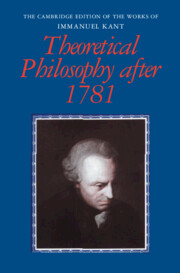Book contents
- Frontmatter
- Contents
- General editors' preface
- General introduction
- Prolegomena to any future metaphysics that will be able to come forward as science (1783)
- Metaphysical foundations of natural science (1786)
- On a discovery whereby any new critique of pure reason is to be made superfluous by an older one (1790)
- What real progress has metaphysics made in Germany since the time of Leibniz and Wolff? (1793/1804)
- On a recently prominent tone of superiority in philosophy (1796)
- Settlement of a mathematical dispute founded on misunderstanding (1796)
- Proclamation of the imminent conclusion of a treaty of perpetual peace in philosophy (1796)
- Editorial notes
- Glossary
- Index of names
- Index of subjects
Prolegomena to any future metaphysics that will be able to come forward as science (1783)
Published online by Cambridge University Press: 29 July 2009
- Frontmatter
- Contents
- General editors' preface
- General introduction
- Prolegomena to any future metaphysics that will be able to come forward as science (1783)
- Metaphysical foundations of natural science (1786)
- On a discovery whereby any new critique of pure reason is to be made superfluous by an older one (1790)
- What real progress has metaphysics made in Germany since the time of Leibniz and Wolff? (1793/1804)
- On a recently prominent tone of superiority in philosophy (1796)
- Settlement of a mathematical dispute founded on misunderstanding (1796)
- Proclamation of the imminent conclusion of a treaty of perpetual peace in philosophy (1796)
- Editorial notes
- Glossary
- Index of names
- Index of subjects
Summary
The Prolegomena to Any Future Metaphysics is the preeminent synopsis in the history of philosophy. Kant completed it about fifteen months after the Critique of Pure Reason was published. He wanted to present his critical philosophy concisely and accessibly, for “future teachers” of metaphysics. He also wanted to convince his fellow metaphysicians “that it is unavoidably necessary to suspend their work for the present,” until they have determined “whether such a thing as metaphysics is even possible at all” (4:255). Although the Critique “always remains the foundation to which the Prolegomena refer only as preparatory exercises” (4:261), Kant nonetheless hoped that the shorter work would be used to assess the critical philosophy “piece by piece from its foundation,” serving “as a general synopsis, with which the work itself could then be compared on occasion” (4:380).
In the Prolegomena, Kant distilled his critical inquiry into the General Question, “Is metaphysics possible at all?” (4:271), which he in turn interpreted as a question about the possibility of synthetic a priori cognition (4:275–6), or cognition through pure reason (that is, independent of sensory experience). To answer the General Question, Kant first asked how synthetic a priori cognition is possible in two areas where he considered it actual: pure mathematics and pure natural science. He found that this possibility (and actuality) could be explained only by positing cognitive structures that the subject brings to cognition, as forms of sensory intuition and categories of the understanding.
- Type
- Chapter
- Information
- Theoretical Philosophy after 1781 , pp. 29 - 170Publisher: Cambridge University PressPrint publication year: 2002
- 24
- Cited by

